Profile
Portrait

The German Sport University Cologne, founded in Cologne in 1947, combines qualified teaching and international research of the highest level. It is the only university in Germany exclusively dedicated to the world of sport and exercise. While sport and exercise science courses are available alongside many other subjects at other universities, the situation in Cologne is unique: all aspects of the exciting field can be studied in detail at 21 institutes, four affiliate institutes and nine academic centres.
moreMission statement

Due to its wide range of specialist fields, the German Sport University Cologne holds a special position amongst the universities on a national and international level. Its research, teaching, further education and consultation activities revolve around sport and exercise as a common and comprehensive point of reference. The university consequently strives to take the structural change in sport and exercise science into account and emphasises the increasing significance of sport and exercise with regard to health, social policy and the economy. Accordingly, the university has greatly expanded the spectrum of tasks and fields of application for sport and exercise science, in the hope of creating new, innovative solutions.
moreUniversity management

The management of the German Sport University Cologne consists of three boards: the President’s Office, the University Council and the Senate. The President’s Office is elected as the central body of the German Sport University. Its chairman, the President, is the senior person among the academic staff and represents the German Sport University Cologne externally. Besides the President, the current President’s Office consists of four Vice-Presidents and the Provost. There are eight members of the University Council.
moreFacts & figures

Did you know that the campus area of the German Sport University is 26 times the size of the Cologne Cathedral? Or that there are more than 1,600 trees on the campus and that the German Sport University has the largest specialised sport and exercise science library in the world? We have compiled amusing and interesting information for you on our Facts & Figures page. Would you like to know how many students there are at the Sport University Cologne, how many people are employed there or what the pass rate is for our physical aptitude test? Take a look at our Facts and Figures. Every year the most important figures concerning budgets, external grants and staffing are summarised in the statistical section of our President’s Office report: KOMPAKT.
moreChronik
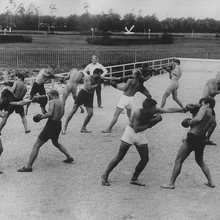
Durch ihren speziellen Gegenstandsbereich nimmt die Deutsche Sporthochschule Köln eine besondere Stellung in der Universitätslandschaft ein, Sport und Bewegung stellen seit jeher den Bezugspunkt für die Forschung und Lehre dar. Die Geschichte der Sportuniversität beginnt jedoch nicht erst mit der Gründung in Köln im Jahr 1947. Mit der 1920 in Berlin gegründeten Deutschen Hochschule für Leibesübungen (DHfL) hatte sich bereits ihre Vorgängerinstitution der – damals noch jungen – Sportwissenschaft verschrieben.
moreCampus
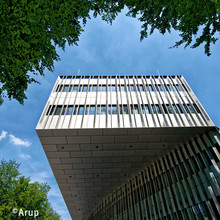
Die Deutsche Sporthochschule Köln ist eine klassische Campus-Universität. Der Begriff Campus stammt aus dem Amerikanischen und hat sich in den 1960er Jahren in Deutschland etabliert. Charakteristisch für eine Campus-Hochschule wie die Kölner Sportuniversität ist, dass Lehr- und Forschungseinrichtungen, Wohnraum für Lehrende und Studierende, Grünflächen sowie die universitätsnahe Infrastruktur auf engem Raum zusammengefasst sind. Das neueste Gebäude auf dem Hochschul-Campus ist das Institutsgebäude Naturwissenschaften und Medizin (IG NawiMedi).
moreEnergiesparmaßnahmen
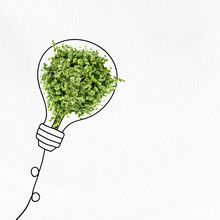
Die DSHS Köln reduziert Ihren CO2-Abdruck und ist insbesondere bestrebt, den Verbrauch von fossilen Energien deutlich zu senken. Aus diesem Grund wurden zahlreiche Verbesserungen in der Gebäudetechnik umgesetzt und effizientere, klimaschonendere Technik eingebaut. Auch die erste Solarthermie-Anlage ist in Betrieb gegangen und die ersten Wärmepumpen versorgen Gebäude ressourcenschonend mit Wärme und Warmwasser.
moreNachhaltigkeit

Als universitäre Einrichtung mit ihren Feldern Forschung und Lehre sieht sich die Deutsche Sporthochschule Köln (DSHS) in einer besonderen Verantwortung für eine zukunftsorientierte, nachhaltige Entwicklung der Gesellschaft. Als Bildungsstätte für künftige Entscheidungsträger und als Zentrum sportwissenschaftlicher Forschung hat die DSHS eine Verpflichtung: Sie vermittelt Wissen, Kompetenzen und Werte und erzeugt Impulse für Innovationen, die für eine nachhaltige Gesellschaft unverzichtbar sind.
moreEhrungen & Mitgliedschaften
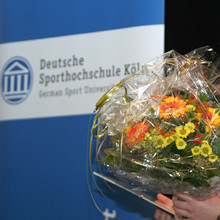
Seit ihrer Gründung 1947 hat sich die Deutsche Sporthochschule Köln stetig weiter entwickelt. Sie ist heute eine international renommierte Forschungsuniversität mit modernen Bachelor-/Masterstudiengängen und mehr als 6.000 Studierenden. Die zahlreichen Mitgliedschaften in unterschiedlichen Netzwerken und Organisationen sind Zeichen ihrer einzigartigen Interdisziplinarität und ihrer national wie international führenden Stellung in der Sportwissenschaft. Ihr kontinuierliches Bemühen um Innovation verbindet die Deutsche Sporthochschule mit dem Bewusstsein einer besonderen Verantwortung gegenüber Sport und Gesellschaft.
moreHuman Resources Strategy for Researchers (HRS4R)
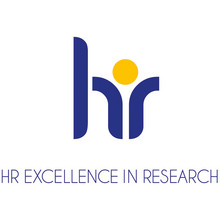
Als international ausgerichtete Forschungsuniversität bietet die Deutsche Sporthochschule Köln ein attraktives Arbeitsumfeld für Forschende aus dem In- und Ausland. Vor diesem Hintergrund hat die Universität beschlossen, sich für die Auszeichnung „HR Excellence in Research“ von der Europäischen Kommission einzusetzen. Das Qualitätssiegel bietet der Deutschen Sporthochschule Köln die Chance, sich im internationalen Wettbewerb um hochqualifizierte Forschende noch besser zu positionieren.
morePhotos

You will find our frequently updated selection of photos, which can be downloaded and used free of charge here. This service is available to those directly associated with the German Sport University Cologne, its institutions, staff and students. Any other use must be given the consent of the Public Relations and Communications Department of the German Sport University Cologne.
more